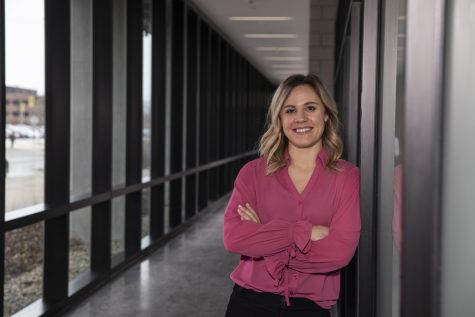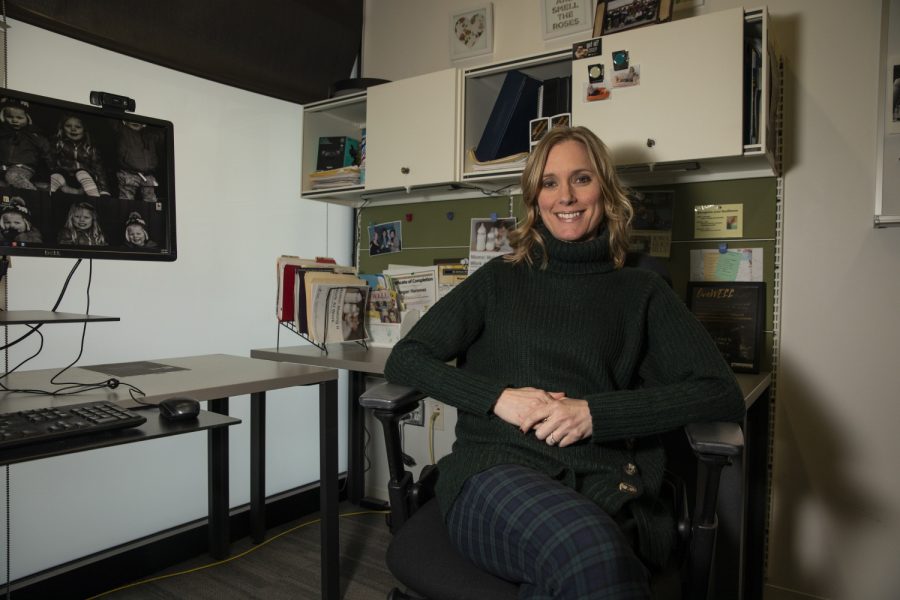University of Iowa liveWELL prepares for weight-management digital program geared toward faculty and staff
University of Iowa liveWELL recently began accepting applications for its new weight-management program for faculty and staff alongside a diabetes-prevention program that opened in January.
Senior Director of UI Wellness Megan Hammes poses for a portrait in her office on Feb. 28, 2020. The upcoming weight management program is designed for University of Iowa faculty.
March 2, 2020
Over a decade since pilot tests began for a weight-management program on campus, University of Iowa Wellness, within University Human Resources is preparing to launch a new liveWELL initiative with an app-based, 10-week weight-management program for faculty and staff.
The program aims to increase physical activity and self confidence, while making people feel in control of their overall weight and health. UI Wellness Senior Director Megan Hammes said the new liveWELL initiative includes health and wellness programs for UI employees and uses collected data to inform decisions for the types of programs that should be offered.
The data are gathered from personal health-assessment surveys that liveWELL has encouraged faculty and staff to complete since its start in 2006.
Related: Fit in Four program promotes healthy living at the UI
Feedback from the three pilot programs, Hammes said, showed the content was easy to understand without being overwhelming, and worked conveniently with participants’ schedules. The platform’s high privacy and confidentiality also received positive feedback, as participants said they would not have felt comfortable in a group setting.
“[Participants said] ‘this is what I was waiting for; I was waiting for something I could do on my own by myself,’” Hammes said. “That was something we hadn’t spent a lot of time considering, it was more to offer it for people who are tech savvy, who appreciate something digital, or maybe somebody that works a night shift — but we hadn’t really considered the [individual and private] aspect that people would enjoy.”
The program began accepting applications in late February and outreach efforts are ongoing to connect with faculty and staff interested in applying before the March 6 deadline.
In an email to The Daily Iowan, UI Department of Health Management and Policy Research Associate Kimberly Merchant said she volunteered as a wellness ambassador for liveWELL in 2012 and communicates information from the program to the College of Public Health’s faculty and staff by customizing her messages with current events, research, and national month themes.
“LiveWELL has done a wonderful job of expanding the meaning of wellness beyond exercise and eating good-for-you food … Now, wellness includes mental health, stress awareness and how to get help, family care, [and] financial health. All of these values are important to the ongoing health and well-being of our faculty and staff who are key to our success as a college,” Merchant said. “We — liveWELL, human resources, and me in my small way — are here to care about the people who are doing all that work and moving public health ahead for the region, state, and world.”

UI Wellness Well-Being Specialist Melanie Cuchna poses for a portrait in the CRWC on Feb. 28, 2020. The upcoming weight management program is designed for University of Iowa faculty.
UI Wellness Well-Being Specialist Melanie Cuchna is working on another program for diabetes prevention developed by the Centers for Disease Control and Prevention, which began at the UI alongside the weight-management program in January.
Cuchna said the prevention program works with individuals who don’t currently have Type 2 Diabetes but display risk factors for its development and wish to prevent or delay its onset in a group environment.
“One thing that is also great about this [program] is the content itself is not very magical. It’s very basic, just general healthy eating and physical activity recommendations, but the reason why I think this program is so successful is the group support,” Cuchna said. “[The program’s] online option is great for people who feel more comfortable doing it by themselves … But this [program] is really for people who may struggle with accountability and [are] really looking for another group of people to encourage them, to support them, and share ideas back and forth.”














